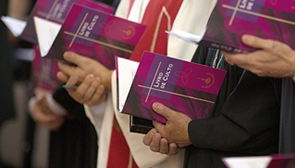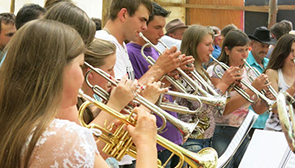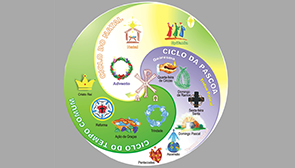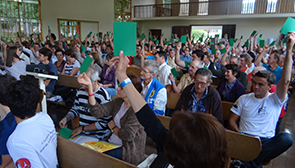
Bible Study 21
Juliana Hoelscher Silveira - Theology Student, and Sabrina Senger – Theologian, Gender and Religion Program - Faculdades EST/IECLB
Theme: Grace Only - Marie Dentiére
Biblical text: Rom. 3: 23-24
Translation: Marcia Blasi.
In this devotional moment we want to reflect on one of the four pillars that are theological principles of the Protestant Lutheran Reformation: “Solla gratia”. The Reformation movement proposed a return of the church to the gospel of Jesus Christ, in opposition to traditions, laws and authorities that were no longer guided by the teachings of Sacred Scripture. A biblical text that provoked and inspired the reformer Martin Luther was Rom. 1:17, which says: since the righteousness of God is revealed in the gospel, from faith to faith, as it is written: the just will live by faith. The concern for God's justice was also the concern for salvation. In this biblical text, Luther found acceptance of his yearnings and fears by concluding that by faith we are people justified by God.
In Romans 3:23-24, we read: for all have sinned and fall short of the glory of God, and all are justified freely by his grace through the redemption that came by Christ Jesus.” Through the writing of the apostle Paul to the Romans, we understand that the Grace of God is the source of our justification, which is granted by Jesus Christ, through faith. That is, it is not by works that we receive salvation and liberation. Grace is independent of our works. Is reflecting from God's grace then exempting us from responsibility for our actions? Obviously not. The most unusual and revolutionary about thinking the grace of God: there is nothing we can do to achieve salvation, because we have not achieved it on merit, different from what was stated in the context of indulgences in which the Reformation took place and what is stated today, in Latin America and the Caribbean, where fundamentalist theologies justify suffering as part of the path to salvation (“this is your cross”) or as an impossibility to receive the blessing of freedom from suffering, for lack of faith or for not living how God expects a person of faith to live.
Many women and men devoted much of their lives to denouncing church abuses and false doctrines that explored people's faith in the 16th century. Because of the patriarchal and sexist structure we usually have access only to the stories of male reformers. Today we share the story of Marie Dentiére, a contemporary of Luther who dedicated her life to contributing to the reflections and transformations brought about by the Protestant Reformation. Her contribution was partially recognized at the Reformers Wall, in Geneva, Switzerland. Partially because for the male reformers a statue was placed. For her, only a stone, not always noticed by those who visit the monument.
Very little is known about Marie's early life. She was born around 1495, in Tournai, Belgium. Marie went to the convent at a young age and had access to the library there. It was in the Augustinian convent that, in 1524, she learned about Luther's writings and adopted the principles of the Reformation. She fled the convent for the city of Strasbourg, where she had a community that had joined the Reformation movement, led by Katharina Schütz Zell and Mateus Zell. Later she married and moved to Switzerland.
Marie actively participated in the Reformation Movement. She wrote and published letters collaborating with the Reformation. At Calvin's invitation, she wrote the preface to one of his sermons. She wrote a letter to Margarida of Navarra, sister of the king of France, asking for an end to inequalities between men and women, inequalities that prevented women from fully assuming their responsibilities as people of faith. She defended the right of women in works such as Defense of Women and A very useful letter. Marie Dentiére worked on evangelization campaigns, despite suffering criticism for the freedom that this task demanded, going from place to place announcing the Gospel. Her life story serves as an illustration and inspiration for our time, where we are often, in different spaces, we are deprived and silenced. Marie was a rebel, in the sense of not being limited to the permissions of time but acting according to her faith.
The Grace of God can be experienced and recognized in different ways in history. God supports us, strengthens and animates us for movements and ransformations in favor of the dignity and fullness of life, especially impacting those who are in the most vulnerable conditions in society. Marie's struggle did not immediately mean a change in women's rights at that time. However, it contributes to the struggle that we still carry on today to overcome exclusionary and violent environments and relationships.
May the divine Ruah keep us in faith and give us courage, just as gave Marie, so that we do not conform to injustices. We ask that when we are tired give us refuge, protect and embrace us. May the God the creator, maintainer and liberator animate and accompany us. Amen.
To reflect:
- How do you experience God's grace in your life?
- Do you know women who inspire you to build gender justice?




















